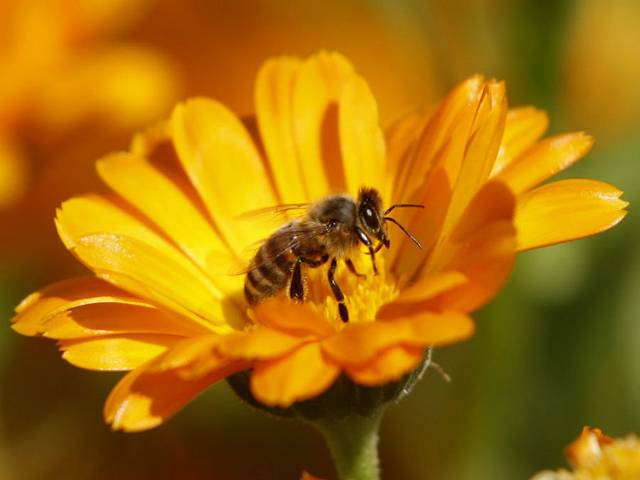Washington-Bees aren’t known for being brainy. While complex hive architecture and their movement-based “language” are impressive feats, these are generally attributed to biological aspects of a large community of bees driven by instinct and little else. Individual bees, after all, are insects, and tend to demonstrate little, if any, autonomous thought outside the group hierarchy.
A new study, however, may challenge this conventional notion.
Researchers trained various bees to play a golf-like game in which an individual bee would push a ball into a specific area in order to get a tasty sugar-water reward. But while training bees to do something is nothing new, this study was far removed from any instinctive behaviors or situations that would occur in the wild. And despite this limitation, the bees took to their new task in unexpected ways, indicating that individual bees could be much smarter than previously thought.
According to the study, published in the journal Science, the researchers taught the bees to push a small ball into a defined area using multiple methods. The first method demonstrated the “game” with a previously-trained bee, or with a plastic model of a bee controlled by the researchers. Another method was a “ghost demonstration,” in which researchers moved the ball to the proper location using a magnet. The final method gave the bees no demonstration at all. Every single bee that was able to view another bee move the ball was able to successfully figure out the solution, whereas about 80 percent of the bees who viewed the “ghost demonstration” were able to beat the game. Only two bees were able to figure out the puzzle with no prior demonstration.
The fact that the bees were able to figure out the game in these circumstances is impressive enough, but researchers were more interested to see how the bees adapted new ways to beat the game more quickly.
“It wasn’t monkey see, monkey do. They improved on the strategy that they saw,” study co-author Clint Perry told NPR. “This all shows an unprecedented level of cognitive flexibility, especially for a miniature brain.”
During one test, for instance, three balls were put into play, but only the one farthest away from the goal was actually movable during the demonstration phase. As a result, the trained bee only used the farthest ball to get the reward. But when the untrained bees were put into the ring with three untethered balls, the new bees immediately used the balls closest to the goal to get the reward even faster than the trained bees.
Other bees took initiative as well. Some took shorter routes than the ones that were demonstrated to them. Others sped up the process by dragging the balls backwards instead of pushing them forward.
“The old-fashioned view is if an animal has a small brain, it’s not intelligent or smart,” Olli Loukola, lead author of the study, told New Scientist. “Our study shows it’s not true that small brains are not capable of this kind of cognitive flexibility.”
Dr. Loukola thinks the study could be an indicator that bees are capable of tool use, a trait thought once to be the purview of an extremely exclusive class of vertebrates.
“If you apply the same level of scrutiny to vertebrate experiments as to those done with insects, you quickly find that although something might at first appear complex, the same simple mechanisms we find in insects also are at play in vertebrates,” he added. But this study alone will not be able to convince many scientists that bees are capable of complex tool usage in the same way that primates and some birds are. Still, Thomas Seeley, a biologist at Cornell University, admits that pushing a ball is pretty far removed from most known instinctive behaviors for bees.
“It’s hard to see how it’s an analog to anything they do in nature,” Dr. Seeley, who has written books about bee behavior, told NPR. “So, it’s an open question. Where did this come from? Is this an extension of the abilities they have to open up flowers?”
But for Dr. Perry, the study indicates that bees are more intelligent than we generally give them credit for—and understanding that is could be helpful in any move towards protecting them. Bees, like many other essential pollinators, have seen a significant downturn in recent decades. Many are now on the brink of extinction due to various combinations of habitat loss, disease, and pesticides.
“We often put ourselves atop a hierarchy, where we’re smart and we have large brains, and anything far removed from us physically or morphologically, especially animals with small brains, must be not smart,” Perry told the Smithsonian. “Understanding that bees and different insects have more complex cognitive abilities can allow us to appreciate them more. And it might help our efforts to manage living with them a little better.”






